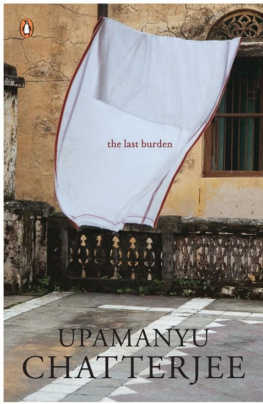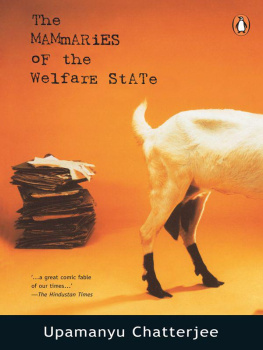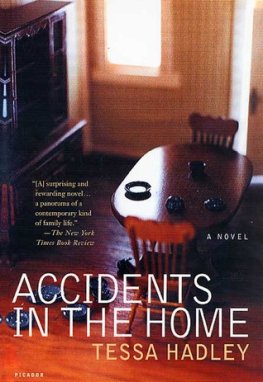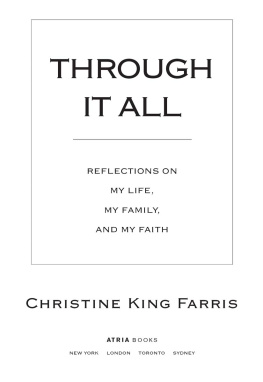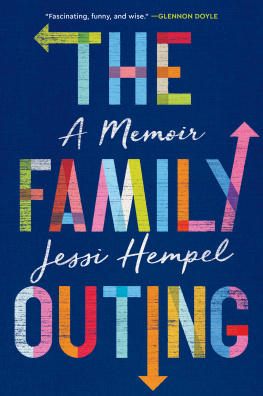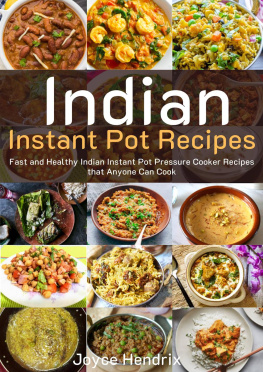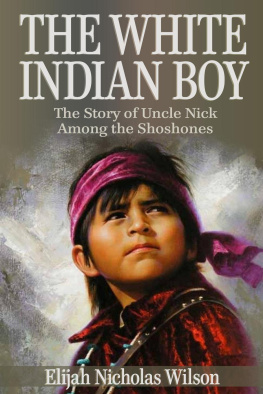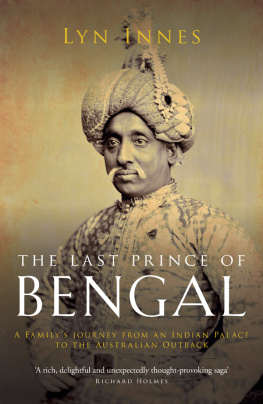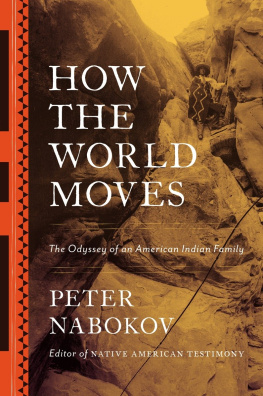Upamanyu Chatterjee was born in 1959. He joined the Indian Administrative Service in 1983. His published works include short stories and the novels English, August: An Indian Story (1988), The Mammaries of the Welfare State (2000), which won the Sahitya Akademi Award for writing in English, and Weight Loss (2006).
Upamanyu Chatterjee is married and has two daughters.
1
AUGUST
For four slow and secret days, Jamun reads Robert Paynes life of Mahatma Gandhi, while outside August slips into a closed and equally febrile September. The on-off rains are warm, troubled, and touch off a dreary ache in the small of the back and a flame beneath the skin. When he gets the telegram calling him home because of his mothers heart attack, it has been raining immoderately and the electricity has gone off. The skys an old old kidney, Hegiste has said, leaning as far back from his ledger as equilibrium permits, arms snarled yogalike over his head, neck angled, eyes half-closed, dreamily sniffing his own armpit.
Jamun books a call, waits for two hours, hears Hegiste abuse the operator, and then walks to the Vayudoot office. In the rain he feels hot and somehow full of blood. From a crushed dog on the road, blood plays like an effluent. Its eyes are blue-white and pupilless, transcendent, frightening. He waits fifty minutes before the besieged bastard can place him on the flight four mornings away.... Such a demand... Festival... Rush...
In the four days Jamun emerges at twilight for cigarettes and potatoes, milk etcetera. Otherwise in the white rooms of his flat he reads the Gandhi life and hears the rain. In the afternoons the waters slip away under the cauterizing sun. Then the white rooms glut with the exhalations of mud of fish and sea, the beach and the wet. In the early mornings, from his verandah he observes the cream crabs in the ooze on which the block of flats has been erected. Later in the month, the river will balloon and Hegiste on the ground floor will share his flat with it. At night he hears the polite tap-tap beyond the windows, in the swelter, in the rain. Not frogs; too well-mannered perhaps the crabs clucking to one another before coition and proliferation, or perhaps a tiny dinosaur with a second-rate larynx wooing admittance through the window so that it might read a book. In the primal slobland and prodigious heat, all is potential.
Burfis letter has preceded the telegram.
Ma might have rectal cancer. It sounds dreadful and is very likely much worse. Haldia said this evening that a lump in the rectum at her age is 75 per cent cancer. He wants to operate. His eyes shone at the money hed pick up. Baba predictably has already suggested that we should divide the bill by five. He telephoned Chhana, who of course is rushing here with opinions.
When Jamun had last seen his valetudinarian mother, he had said, I returned because I was afraid that I would not see you again, but his father had not been touched. Yet his father himself has often murmured, with a kind of distaste, while his mother naps on the sofa in front of the TV, She will not live long. She herself has contended the same for the last twenty-two years. She has also said, fitfully, I want to go and stay with you, Jamun. But he has circumvented. Rectal cancer. If she endures, she will trail around with a polythene bag affixed something like that. Because Haldia will take away her sphincter and perhaps hawk it to a snooty restaurant, where it might well be used for an hors doeuvre, a phrase which its customers will not fathom unless pronounced as whores dee overs, like Punjabi streetwalkers at cricket. Plus, Jamuns mother also has had to combat her hypertension, her piles, corns, arthritis, heart, marriage, her mind.
Jamun hasnt written home for a while out of listlessness. They havent written either. His fathers last letter, now quite old, has run on an on about his own listlessness.
Here in this boomtown waste Jamun has bought the same brands of refrigerator and geyser as at home, and has also struggled to debar the blues from his white rooms. At home, depression wafts out from the whitewash downstairs, but Burfis rooms on the first floor, in contrast, like Hegistes flat, have always seemed to exhale light.
The third evening, on the roof of the building, draughty, forehead cooling. Pretty sick of Robert Payne, watching the river, orange and thick, recalling his mother in the kitchen, pottering. Jamun, the anger of parents is never anger. All at once a white bird the colour of cold milk, gliding across the wet verdure of trees between river and gynae hospital. The wings wave in silent, tireless eurhythmy like ballerinas bidding farewell.
Just then, down the ramp of the hospital comes a young woman hand gripping railing, pendulating clumsily on splayed legs, enfeebled, in pain, groping perhaps walking was prescribed. She wears a pink salwaar kameez and a black chunni an ineffable Muslim mien and Hegiste has time and time again said that untaxed Gulf money has raised the hospital. Without warning, Jamun pines to procreate too, to feel an illimitable and unfading, secret agony, then nothing, then to crawl gracelessly out and see a new world. He sees the bird and the woman and knows that in biding his time for four days, he has sinned profoundly.
Dinner with Hegiste the first evening. Spoke to Burfi at last, its only the heart attack, thank God I mean, not rectal cancer. Shes still in Intensive Care. My father said I need not come if I find it difficult to get away.
Hegiste and Jamun step out for cigarettes at six. Hegistes son, three and a half, endomorphic and captious, wants to go too. He puts Jamun in mind of one of his own nephews, Doom, aged four, though between the two there is no specific likeness. On his last visit, on the last day, on his way out, he had gaped at Doom kicking up a big big fuss. I want to go with Jamun, I want. No Uncle, nothing, just Jamun. And with each want Dooms head bobs. Everyone is amazed, for Jamun is not irresistible to children. Jamun is unduly touched and mantles with delight. This hankering for his company who has evinced it? Kasturi? His mother?
Or even his father? Consummately smashed, head undulating, AWOL three nights running in one of those cold sweat years late teenage, hadnt it been? When he came in, and his mother had shifted from anxiety to anger, and no one was listening to her, his father said, sombrely, In your whole life, no one will wait for you as we have waited, as tensely, with as much anguish. No one else will be as happy to see you. To no one else will you matter. Never again will anyone want you like we, or start at the sound of your voice, or your step, in all your years.
Hegiste has moved up from Gold Flake Kingsize to Classic. If youd made an effort at the booking, whipped up your anger, or wept and wailed a little, you couldve caught this evenings flight.
Two women ahead of me in the queue conceived dead fathers. One was to zip straight to the ghat from the airport. In comparison, my mother was merely dying.
A cola for the kid, who bubbles into the straw. But its good that the whole family is together. Except you, of course. Like the joint family of an earlier generation. Especially in a crisis. Hegiste is comradely and outgoing, and avid about others. And your parents are clocking their years out with all

